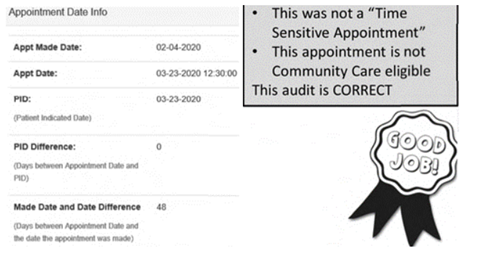
More VA documents expose wait-time manipulation and denial of care
The more we find out, the worse it gets.
A new wave of documents obtained through a Freedom of Information Act request provide more evidence that the Department of Veterans Affairs is purposefully keeping veterans away from community health care options by miscalculating appointment wait times.
These revelations are further confirmation that the VA is actively skirting the law by ignoring standards for veterans to access timely care laid out in the VA MISSION Act.
Take a look at what we’ve found out.
Extra barriers in the way of care
Last year, CVA shared a first round of FOIA findings from VA documents that revealed shocking, though unsurprising, actions from the VA. We learned the VA:
- Isn’t using updated eligibility standards for veterans who should have access to community care.
- Is manipulating wait times by canceling and rescheduling veterans’ appointments to create the appearance of shorter waits.
- Is not properly tracking whether veterans are refusing community care – meaning there is no way to know whether veterans are being offered the option and declining it or aren’t being offered the option at all.
- Is actually training its employees on how to dissuade veterans from using community care.
The VA’s behavior presents a real danger for veterans whose health is on the line. Getting care when they need it is vital.
Newly obtained documents provide more of the story of how the VA is putting up additional obstacles to keep veterans out of community care and in the VA system.
A training document from the VA creates an extra layer of review by VA administrative staff (that isn’t required by law) before a veteran can be determined eligible for community care. Here’s what it says:
“After eligibility has been confirmed, clinical review is performed to determine if the requested services are clinically appropriate to be authorized for delivery in the community.”
When eligibility has been confirmed, that should be the end of it. Confirmed eligibility should not trigger a further review that stands as a barrier to care.
VA congratulates itself on its own mismanagement
Then there is the continued manipulation of wait times to lock veterans into VA appointments.
When a veteran’s appointment wait is longer than 20 days for primary care or 28 days for specialty care, that veteran becomes eligible for community care. So what VA schedulers and administrators have done is game the system by using the wrong dates to calculate wait times. This keeps the wait times low and keeps veterans at the VA.
Rather than calculating wait times from the date a veteran first requests an appointment, VA staff uses a “patient indicated date,” or the date on which the veteran would like to be seen. Patient indicated date gives staff more leeway to schedule appointments outside the 20/28-day rule, which denies veterans eligibility for community care.
Here’s an example from the FOIA review. This appointment scheduling shows there were 48 days between the date a veteran requested an appointment to the date of the appointment. But there are 0 days between the patient indicated date and the date of the appointment. This means the veteran who should have been eligible for community care was deemed not eligible because the patient indicated date was used to determine eligibility.
The “good job” seal the VA put on the record is an especially harsh slap in the face as the VA congratulates itself on its own manipulation of wait times.
We’ve said this a lot, but it’s worth repeating: The VA is taking deliberate steps to take health care decisions out of veterans’ hands and put them in the hands of the bureaucracy.
The VA has a responsibility to provide veterans with timely, quality care in accordance with the law, whether that means care at the VA or care in the community. But as this evidence makes clear, that just isn’t happening.
Veterans should have the freedom to choose where they seek their medical care. Tell lawmakers to support the Veterans Health Care Freedom Act.





